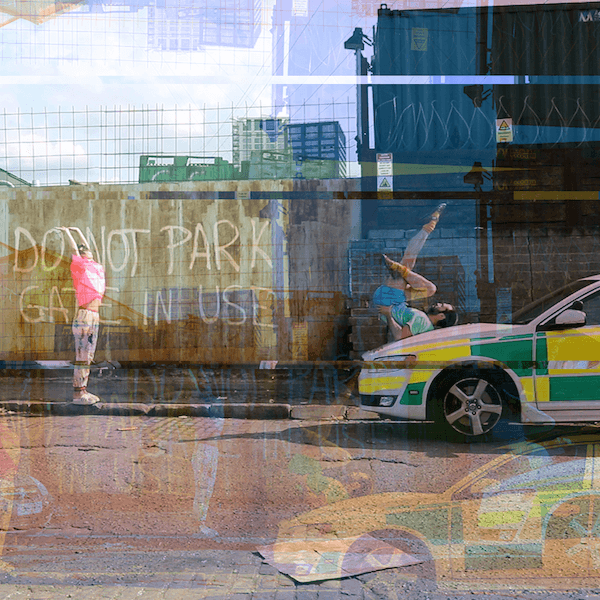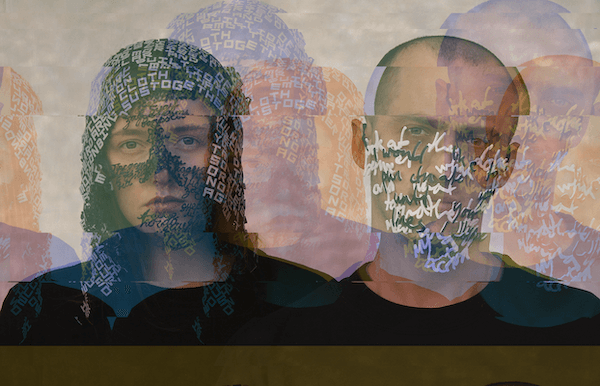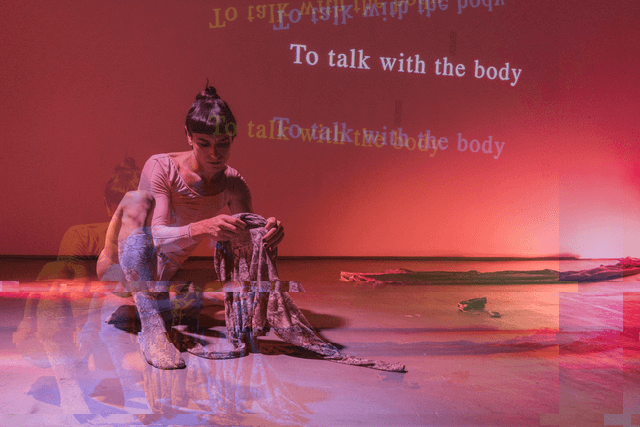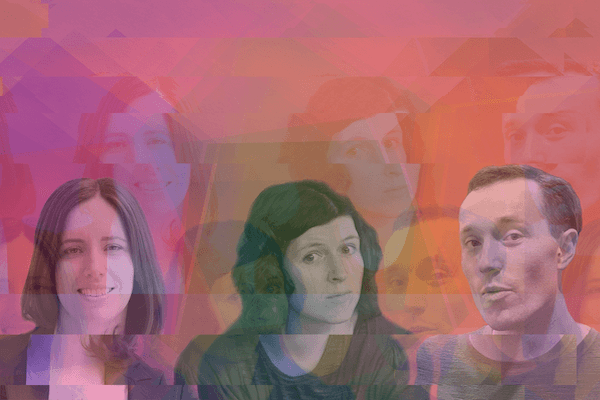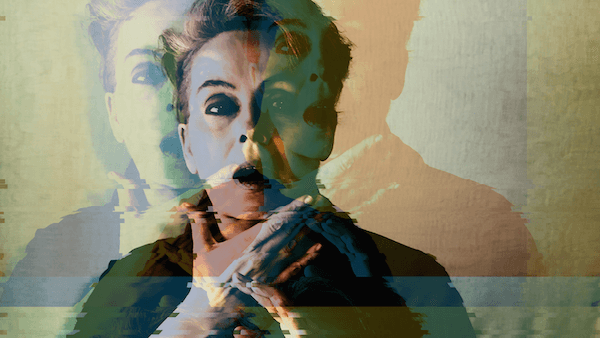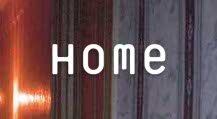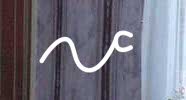Iris Colomb and Camilla Nelson introduce their new SLANT event, Writing Bodies, to be livestreamed on the 21st and 22nd of March
How can language move through a body? How can a body move through language?
SLANT is an investigative platform currently delivering a programme of online events focussed on different strands of poetic performance. Our next event, Writing Bodies, exploring the interaction between body, word and movement, co-curated with language artist Camilla Nelson, will livestream on the 21st and 22nd of March 2021.
Words do not communicate only (or even) that which they intend to communicate. Language is always in excess of itself. The emphasis on materiality, process and performance of Writing Bodies owes much to the tradition that gave rise, contributed to and grows out of Writers Forum. The poet and scholar Robert Sheppard has written about how the work of Writers Forum was an ‘irruption of thingness in language.’ Both Writing Bodies curators have participated in the Writers Forum series Sheppard writes about. Although neither of us met Bob Cobbing, the founder, both joining a few years after his death, we participated in several sessions and events run by Lawrence Upton, in his stead, and continue to work with many who contributed to the series over the years. The cross-genre experiment, the treatment of language as something that moves, sounds, takes up space, is embodied, heard, seen and felt is very much alive in the SLANT series as a whole, as it was in Cobbing and Upton’s Writers Forum gatherings. Sheppard writes that, it ‘is the irruption of material historical occasion, of making, validation, and performance of the text, that will unsettle linguistic systems, and declare its rooted but excessive presence’ (Sheppard in Cobbing, 1998). This understanding of language as an art form shot through by the influence of a myriad disciplines, informed by multiple dimensions and rich with possibility is at the forefront of this showcase.
2 for a fiver
Camilla Nelson
Writing Bodies presents the work of a broad range of multidisciplinary performers, including Co-Curator Camilla Nelson, headliners Niya B and Michael McShane & Ekaterina Luzgina, and contributors Diana Hope Tegenkamp, 2 for a fiver, and Jenn Kirby, Robbie Blake & Sinead Hayes. They will present six pieces, exploring challenge and possibility in the body (Tegenkamp), reaching beyond the human (B), exploring the generative relationship between sounding and moving bodies (Kirby, Blake & Hayes), playing with the body’s disruptive potential in domestic contexts (2 for a fiver) and more overtly linguistic contexts (Nelson), and creating entirely new bodies of language (Luzgina & McShane). These writing bodies challenge expectations, generating novel performative ways of working with words in motion.
Our UK headliner, the artist duo Ekaterina Luzgina & Mike McShane, originating from Russia and the UK respectively, work with sculpture, performance and film to create spatial, kinetic, and interactive textual pieces through which words surpass semantic fixity to become independent bodies of meaning. Luzgina & McShane aspire to create an uncontrolled ballet of automata, a world in which cybernetic theory moves away from the realm of mechanistic control into one of dissonance and chance. Our anticipation of what words might be and do expands in the moment of encountering this work.
Niya B, photo by Zbigniew Tomasz Kotkiewicz
Ekaterina Luzgina & Mike McShane
The performative practice of our European headliner, Niya B, addresses ecological, posthuman and transfeminist concerns. Niya B uses durational actions, choreographed narratives, somatic improvisations, and (pre-pandemic) physical interactions with live audiences to explore transformation, vulnerability and interdependence. Her piece in this showcase, I Was Once The Snake Woman, reaches beyond the human perspective, using Margaret Atwood’s poem ‘Snake Woman’ to reinterpret the Myth of Tiresias - a Greek seer, transformed into a woman after wounding a pair of mating snakes - to produce a deeply affecting, multisensory experience.
Diana Hope Tegenkamp is a Métis poet, writer and artist whose performance work plays with notions of internal and external trauma. UNMUTE: Warmups for Body Vocality is rooted in Tegenkamp’s experience of selective mutism in response to trauma. This performance is a textual and gestural dance in which the body moves through a range of expressive tonalities to confront and, at times, speak the unspeakable.
Retain, Reject, Transform is the title of Jenn Kirby, Robbie Blake and Sinead Hayes’ new digitally mediated collaboration for conductor, voice and electronics, harnessing the possibilities, limits and generative discrepancies of video calling. This semi-improvised movement and text work takes ‘Der Mondfleck,’ No.18 in Arnold Schoenberg’s Pierrot Lunaire song cycle, as a starting point from which Jenn, Robbie and Sinead will attempt to hear and respond to each other’s remote gestures.
Diana Hope Tegenkamp
Jenn Kirby, Robbie Blake & Sinead Hayes,
by Daryl Feehely
The performance duo, 2 for a fiver (Alice Esmė & Luis Amália), work with movement, costumes, sound and space to produce playful critiques of spatial norms, exploring absurdity as a mode of resilience. In their new and immersive online piece, High Noon, 2 for a fiver respond to remote collaborators, poet Keith Jarrett and singer M@artadelas, performing and deforming gender, subverting the private domestic space in a celebration of the layeredness of identity and refusal to be contained.
Camilla Nelson is a British language artist working with words on, in and between the page, installation, sound and movement. Her contribution to this showcase, Reading Movement, is an extended solo treatment of John Hall's "Reading (il)legible Pages" published in ‘On the Page’, Performance Research: Vol. 9; No.2, June 2004. The reading body is so often stilled and silenced. Reading Movement offers the body a chance to move, to be seen and heard. This work suggests that by liberating the body from the restrictions of normalised reading behaviours, by physically and sonically disrupting and extending the act of reading, the signifying potential of the reading self might ultimately be transformed.
Over the past year, our bodies have been subjected to radical new restrictions. Pandemic regulations have affected the way we move on multiple levels; our relationships with public and private spaces, our interactions with other bodies and our experience of our own. This imposed pause may have forced our writing bodies into difficult or unfamiliar routines or behaviours. It might have limited our sense of agency. The continuous sense of threat, punctuated by a multitude of immediately effective disruptions, may have induced stress, fatigue or inertia. Whatever your experience, we hope this showcase will offer an occasion to rediscover the plethora of creative potential housed within our various writing bodies.
We look forward to seeing you (online) on the 21st and 22nd of March, (8pm London time), at IKLECTIK off-site.


